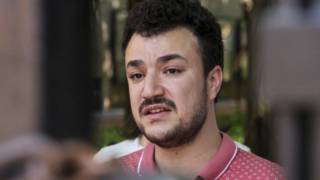HeadlinesApril 14, 2005
Abortion Clinic Pleader Pleads Guilty, Offers No Apology
Abortion clinic bomber Eric Rudolph pleaded guilty Wednesday to a series of attacks that killed two and injured more than 120 people. During a span of two years beginning in 1996 he bombed two abortion clinics, a gay nightclub and the Olympic Park in Atlanta. Rudolph was sentenced to four life sentences without parole. But he escaped the possibility of the death penalty by pleading guilty and telling authorities where he had stored hundreds of pounds of unused explosives. He said Wednesday that he had no apologies for his actions. In an 11-page letter Rudolph wrote, “Because I believe that abortion is murder, I also believe that force is justified … in an attempt to stop it.” He went on to say “Whether these agents of the government are armed or otherwise they are legitimate targets in the war to end this holocaust.”
18 Die in Twin Suicide Bombings in Baghdad
In Iraq, at least 18 people have died in a double suicide bombing in central Baghdad. Two car bombs blew up almost simultaneously in massive explosions that shook buildings throughout the city. Police said several children were among the dead. More than 30 people were also wounded in the blasts. The double bombing comes a day after another blast in Baghdad killed five Iraqis and injured four American contractors. Meanwhile in Kirkuk, three police officers and a civilian were killed earlier today in a drive-by-shooting.
U.S. Hostage in Iraq Pleads For His Life in Video
On Wednesday Al Jazeera aired footage of an American hostage in Iraq pleading with the Bush administration to withdraw troops from Iraq. The man in the video is believed to be Jeffrey Ake–a contractor who was kidnapped on Monday by eight hooded men from a construction site north of Baghdad. Ake was in Iraq working on a water purification plant project. In the video recording he urged the troops to pull out and called on Washington to “open a dialogue with the Iraqi resistance” in order to save his life.
Six Guantanamo Detainees Sue U.S. Citing Abuse
Lawyers in Boston representing six detainees being held at Guantanamo Bay filed a federal lawsuit Wednesday against the U.S. government. The suit alleges widespread abuse and torture at the prison. All six detainees are Algerian nationals who were picked up in Bosnia and then taken to Guantanamo. One of the Algerian men alleges that U.S. military guards jumped on his head until he had a stroke that paralyzed his face. He also charged that the guards nearly drowned him in a toilet, broke several of his fingers and sprayed tear gas at him. The man — Mustafa Ait Idir — was accused of plotting with five others to blow up the U.S. Embassy in Sarajevo in November 2001. All were acquitted by Bosnia’s highest court in January 2002, but U.S. agents arrested them anyway as they left the courthouse. They were eventually taken to Guantanamo Bay. At the time the U.S. was criticized for seizing the men after they were acquitted. The United Nations’ top human rights official in Bosnia said the arrest of the men undermined the respect for the rule of law, due process, and human rights. Madeleine Rees said “The United States is behaving like a rogue state.” At the time U.S. officials vowed the six detainees would be “treated humanely and according to international law.” The lawsuit filed Wednesday is the first effort to use the Freedom of Information Act to compel the Bush administration to disclose medical records and video recorded at Guantanamo.
New Questions Arise Over John Bolton
This update on the John Bolton confirmation process–the Senate Foreign Relations Committee has put off for another week a vote on Bolton’s nomination to serve as ambassador to the United Nations. On Wednesday Democratic Senator Christopher Dodd asked the committee’s chair Republican Richard Lugar to hold a third public hearing on Bolton’s nomination. Thus would allow testimony from a top CIA official and three State Department officials. The New York Times reports that in closed-door interviews all four officials have provided accounts of two episodes in which, they said, Bolton sought to remove intelligence analysts from their posts. In addition, the Times reports Dodd has requested that Bolton explain to the committee why he made several requests of the National Security Agency to hand over details of intercepted communications involving other American officials. On Monday Bolton admitted he made such requests '’on a couple of occasions, maybe a few more.'’ Bolton told the committee that his only motivation had been '’to better understand'’ a summary of an intercepted conversation, saying that on some occasions, ’’it’s important to find out who is saying what to whom.’’
Health Committee Delays Vote on FDA Nominee
Meanwhile the Senate Health Committee has postponed a vote on the nomination of Lester Crawford to head the Food and Drug Administration. Senators said they needed more time to investigate allegations against Crawford made anonymously by an employee of the FDA. Details of the allegations were not made public.
EPA Nominee OK’d By Senate Panel
And the Senate Environment and Public Works Committee voted 17 to 1 Wednesday to approve Stephen Johnson to become the next head of the Environmental Protection Agency.
House Votes to Repeal Estate Tax
In other news from Washington, the House voted to permanently repeal the federal estate tax.
FDA Panel Oks The Sale of Silicone Breast Implants
And an FDA advisory panel unexpectedly voted seven to two to allow a California company to start selling silicone breast implants. The vote came a day after the panel rejected a similar petition from another company. Dozens of women appeared before the panel to state that the implants had sickened them severely when the silicone ruptured.
Anheuser-Busch Says No To Genetically Modified Rice
In business news, the Anheuser-Busch Company has announced it will stop buying rice from Missouri if genetically modified, drug-making crops are allowed to be grown in the state. The St. Louis-based Anheuser-Busch is the nation’s largest brewer and buyer of rice. The company Ventria Biosciences is seeking permission to grow 200 acres of rice engineered to produce human proteins that can make drugs. Last month the world’s largest rice miller–Riceland Foods–asked federal regulators to deny Ventria a permit.
Philadelphia to Pay $13M to Homeowners Affected by MOVE Bombing
And in Philadelphia, a jury has ordered the city to pay out nearly $13 million to a group of 24 homeowners in connection to the city’s bombing of a city block 20 years that targeted the political group MOVE. The May 1985 bombing resulted in the deaths of 11 people including five children. It also destroyed 61 homes.
Most popular
- 1
- 2
- 3
- 4
Non-commercial news needs your support
Please do your part today.











Media Options